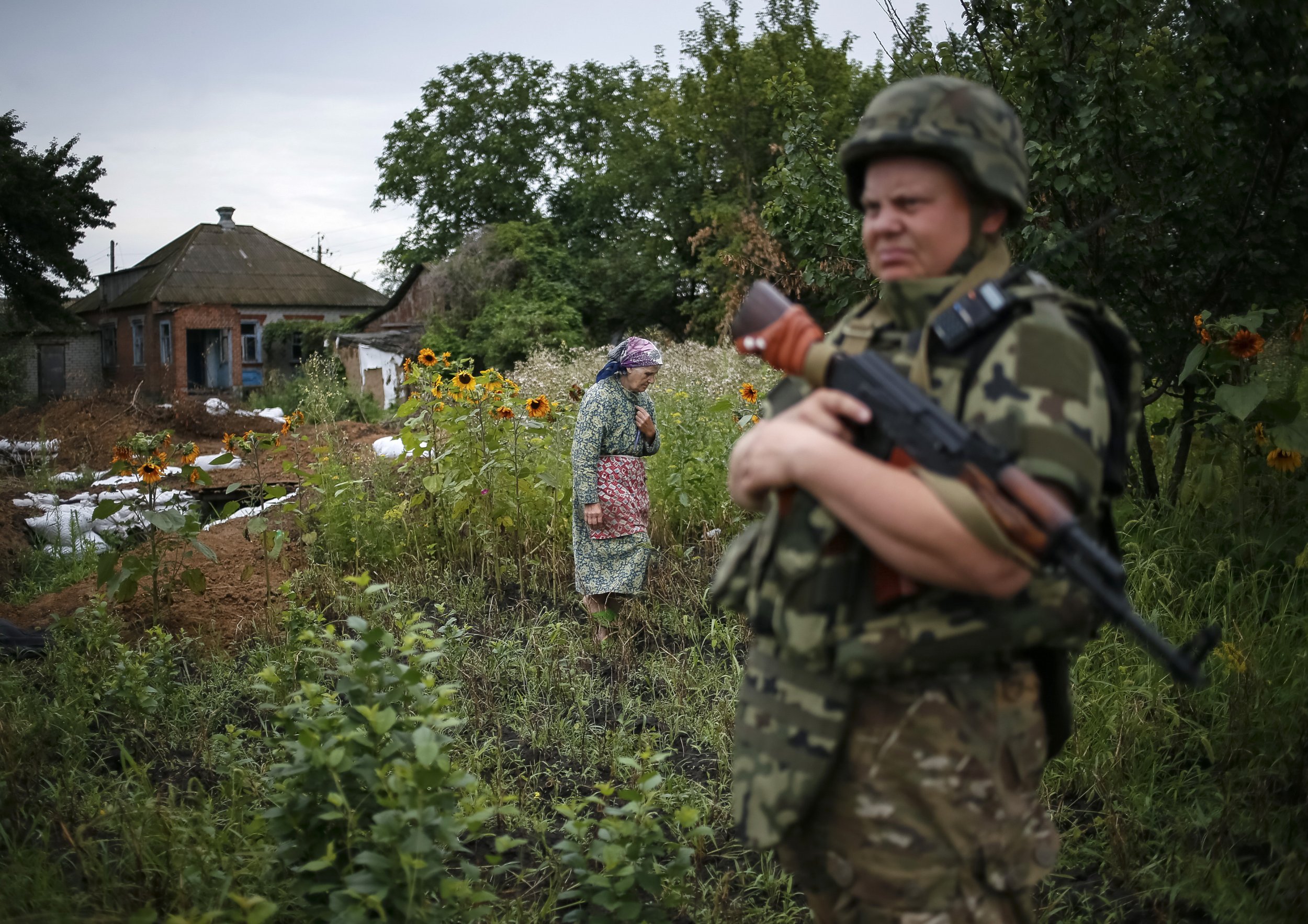
KIEV (Reuters) - Ukraine made fresh charges of Russian involvement in its conflict with separatist rebels, suggesting Moscow may have had a role in an air strike on Tuesday that killed at least four people.
The accusations come a day before European Union leaders meet to discuss the crisis, where they might consider adopting fresh sanctions against Russia.
"Tomorrow in Brussels, the heads of state and government will again assess the situation on the ground and, should it be required, adopt necessary decisions," the bloc's enlargement commissioner Stefan Fuele told the European Parliament in Strasbourg.
In other fighting in the three-and-a-half month conflict with separatists in the Russian-speaking east of Ukraine, government forces said they had lost another six soldiers in attacks on their positions near the border with Russia.
In all, since the start of the government's "anti-terrorist" operations in mid-April, a total of 258 Ukrainian servicemen have been killed, 922 injured and 45 are captive, military spokesman Andriy Lysenko said. Hundreds of civilians and rebels have also died.
Pushing hard for the EU - Ukraine's new strategic partner - to take tougher measures against Russia at its Brussels summit on Wednesday, Kiev pointed to the downing of an An-26 military transport plane on Monday and Tuesday's air strike on the Ukraine town of Snizhne.
The town's municipal authorities said at least four people had been killed and four others injured in the attack, which hit a residential area of Snizhne, 20 kilometres (12 miles) from the border with Russia, destroying 12 apartments.
A separatist leader was quoted by Russia's Interfax news agency as saying 10 people had been killed in the attack, which he said was the work of a Ukrainian warplane.
But military officials and the foreign ministry said no Ukrainian fighter planes had taken off since Monday because a search and rescue operation was underway in the area for survivors of the downed An-26.
"Today at 7 a.m. (0400 GMT) an unknown plane carried out a bombing attack on Snizhne. The flight can be described only as a cynical provocation," Lysenko, a spokesman for Ukraine's National Defence and Security Council, told reporters.
His remarks appeared to be an accusation against Russia, since the rebels have not used aircraft in the conflict.
Kiev's fresh charges follow its accusation on Tuesday that the rocket that downed the An-26 may have been fired from Russian territory.
TOUGHER SANCTIONS CALL
Foreign ministry spokesman Vasyl Zvarich, also suggesting Russian involvement in the Snizhne attack, saidUkraine hoped the EU's threats to move to a tougher level of sanctions against Russia were not simply "declaratory".
The EU last Saturday targeted Ukrainian separatist leaders with travel bans and asset freezes on Saturday, avoiding fresh sanctions on Russian business to avoid antagonising Moscow, its main energy supplier.
Saying Ukraine had proof of Russian participation in the activities of the rebel fighters, Zvarich said: "We hope that a resolution will be taken which will give an objective evaluation of Russia's actions in Ukraine's eastern regions and will also condemn Russia's support for terrorist and separatist groups."
Fighting over the past four months between forces of the pro-Western Kiev government and separatists who want union with Moscow has intensified since last Friday, with Ukraine and Russia blaming each other for cross-border attacks.
Russia has accused Ukrainian forces of firing a shell that hit a house inside Russian territory last Sunday, killing a Russian man and injuring a woman. Kiev has denied its forces were involved.
Vladyslav Seleznyov, spokesman for what the government calls its "anti-terrorist operation", said four crew members who had survived the downing of the An-26 had been found, while two others had been captured by rebels. The fate of the remaining two people on board was not known.
Military sources said two of the six servicemen killed in the past 24 hours had been killed by high-powered Grad missiles.
In the rebel-controlled town of Luhansk, also the scene of fierce combat since last Friday, 17 civilians have been killed and 73 others wounded from shrapnel and gunfire in the past three days, the town's municipality said, declaring three days of mourning.
'CONTACT GROUP'
Violence erupted in Ukraine's Russian-speaking east following a pro-Europe revolt in Kiev that ousted a Moscow-backed president in February and led to Russia's annexation of Crimea.
Ukrainian President Petro Poroshenko, who has led the way in pressing the EU to take a harder line withMoscow, said on Monday that Russian military officers were now fighting alongside separatists and heavy military equipment was pouring across the border from Russia.
Poroshenko, elected in late May, refused on June 30 to extend a 10-day unilateral ceasefire which he said had been breached repeatedly by the separatists. He renewed the government's military campaign to break rebel resistance.
The separatists, who have set up 'people's republics', have been pushed back into the main eastern city ofDonetsk, though they also remain in control of the border city of Luhansk.
German Foreign Minister Frank-Walter Steinmeier, in a new peace effort, said a diplomatic contact group might talk to separatists by video conference on Tuesday and meet them in person soon afterwards.
He said all parties were making a "strong effort" for the group - which includes Russia, Ukraine and theOrganization for Security and Cooperation in Europe - to hold the video conference and agree a venue for a direct meeting with the rebels.
Moscow has invited foreign military attachés to visit the Russian town hit by fatal shelling on Sunday, an event for which it threatened "irreversible consequences". Ukraine denied that its armed forces were responsible for the incident.
Uncommon Knowledge
Newsweek is committed to challenging conventional wisdom and finding connections in the search for common ground.
Newsweek is committed to challenging conventional wisdom and finding connections in the search for common ground.





